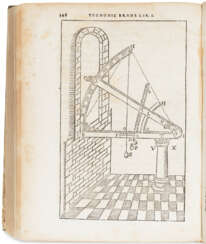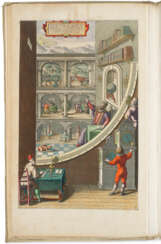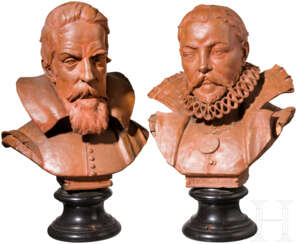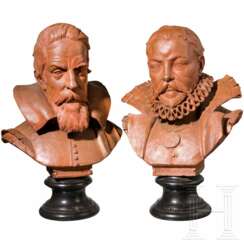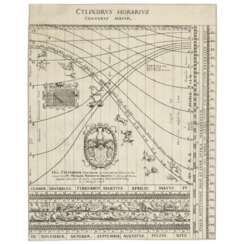тихо браге (1546 - 1601)
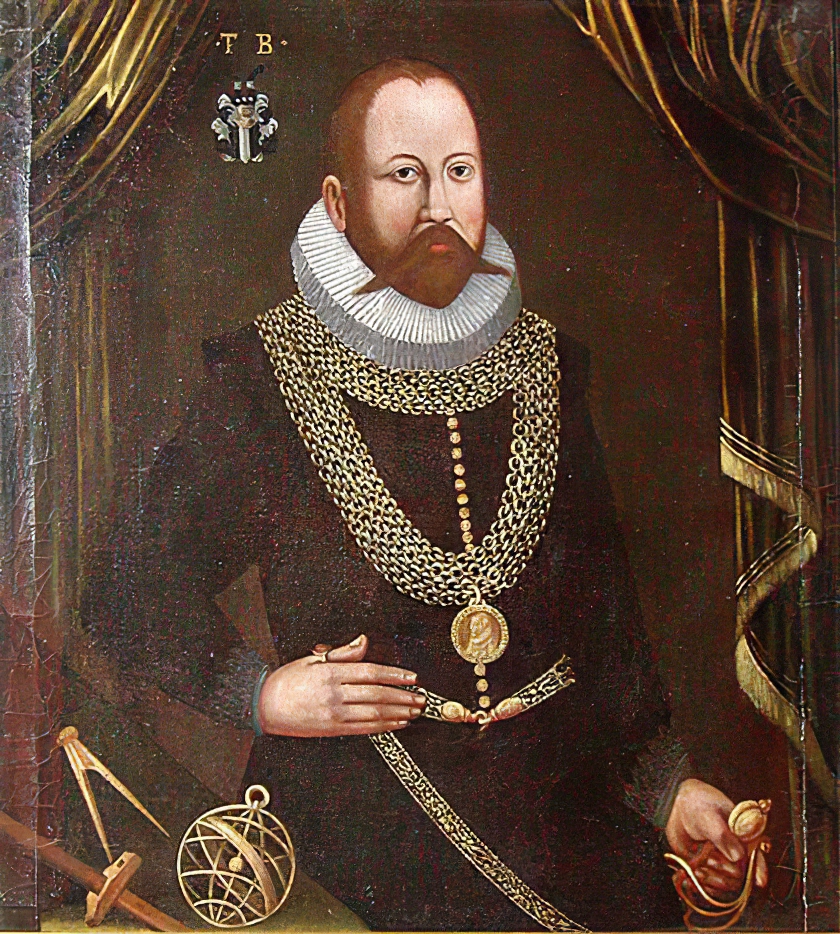
Tycho Brahe, born Tyge Ottesen Brahe, more commonly called Tycho, was a prominent Danish astronomer, astrologer, and alchemist of the Renaissance.
As a young man he traveled extensively throughout Europe, studying in Wittenberg, Rostock, Basel, and Augsburg and acquiring mathematical and astronomical instruments. In 1572 Tycho unexpectedly even for himself discovered a new star in Cassiopeia, and the publication of this turned the young Dane into an astronomer of European reputation. For further astronomical research he established an observatory and gathered around him modern progressive scientists.
Besides practicing astronomy, Tycho was an artist, scientist, and craftsman, and everything he undertook or surrounded himself with had to be innovative and beautiful. He even founded a printing house to produce and bind his manuscripts in his own way, and he perfected sanitary ware for convenience. His development of astronomical instruments and his work in measuring and fixing the positions of the stars laid a solid foundation for future discoveries.
Tycho's observations - the most accurate possible before the invention of the telescope - included a comprehensive study of the solar system and the precise positions of more than 777 fixed stars. What Tycho accomplished using only his simple instruments and intellect remains a remarkable achievement of the Renaissance.


Tycho Brahe, born Tyge Ottesen Brahe, more commonly called Tycho, was a prominent Danish astronomer, astrologer, and alchemist of the Renaissance.
As a young man he traveled extensively throughout Europe, studying in Wittenberg, Rostock, Basel, and Augsburg and acquiring mathematical and astronomical instruments. In 1572 Tycho unexpectedly even for himself discovered a new star in Cassiopeia, and the publication of this turned the young Dane into an astronomer of European reputation. For further astronomical research he established an observatory and gathered around him modern progressive scientists.
Besides practicing astronomy, Tycho was an artist, scientist, and craftsman, and everything he undertook or surrounded himself with had to be innovative and beautiful. He even founded a printing house to produce and bind his manuscripts in his own way, and he perfected sanitary ware for convenience. His development of astronomical instruments and his work in measuring and fixing the positions of the stars laid a solid foundation for future discoveries.
Tycho's observations - the most accurate possible before the invention of the telescope - included a comprehensive study of the solar system and the precise positions of more than 777 fixed stars. What Tycho accomplished using only his simple instruments and intellect remains a remarkable achievement of the Renaissance.


Tycho Brahe, born Tyge Ottesen Brahe, more commonly called Tycho, was a prominent Danish astronomer, astrologer, and alchemist of the Renaissance.
As a young man he traveled extensively throughout Europe, studying in Wittenberg, Rostock, Basel, and Augsburg and acquiring mathematical and astronomical instruments. In 1572 Tycho unexpectedly even for himself discovered a new star in Cassiopeia, and the publication of this turned the young Dane into an astronomer of European reputation. For further astronomical research he established an observatory and gathered around him modern progressive scientists.
Besides practicing astronomy, Tycho was an artist, scientist, and craftsman, and everything he undertook or surrounded himself with had to be innovative and beautiful. He even founded a printing house to produce and bind his manuscripts in his own way, and he perfected sanitary ware for convenience. His development of astronomical instruments and his work in measuring and fixing the positions of the stars laid a solid foundation for future discoveries.
Tycho's observations - the most accurate possible before the invention of the telescope - included a comprehensive study of the solar system and the precise positions of more than 777 fixed stars. What Tycho accomplished using only his simple instruments and intellect remains a remarkable achievement of the Renaissance.


Tycho Brahe, born Tyge Ottesen Brahe, more commonly called Tycho, was a prominent Danish astronomer, astrologer, and alchemist of the Renaissance.
As a young man he traveled extensively throughout Europe, studying in Wittenberg, Rostock, Basel, and Augsburg and acquiring mathematical and astronomical instruments. In 1572 Tycho unexpectedly even for himself discovered a new star in Cassiopeia, and the publication of this turned the young Dane into an astronomer of European reputation. For further astronomical research he established an observatory and gathered around him modern progressive scientists.
Besides practicing astronomy, Tycho was an artist, scientist, and craftsman, and everything he undertook or surrounded himself with had to be innovative and beautiful. He even founded a printing house to produce and bind his manuscripts in his own way, and he perfected sanitary ware for convenience. His development of astronomical instruments and his work in measuring and fixing the positions of the stars laid a solid foundation for future discoveries.
Tycho's observations - the most accurate possible before the invention of the telescope - included a comprehensive study of the solar system and the precise positions of more than 777 fixed stars. What Tycho accomplished using only his simple instruments and intellect remains a remarkable achievement of the Renaissance.


Tycho Brahe, born Tyge Ottesen Brahe, more commonly called Tycho, was a prominent Danish astronomer, astrologer, and alchemist of the Renaissance.
As a young man he traveled extensively throughout Europe, studying in Wittenberg, Rostock, Basel, and Augsburg and acquiring mathematical and astronomical instruments. In 1572 Tycho unexpectedly even for himself discovered a new star in Cassiopeia, and the publication of this turned the young Dane into an astronomer of European reputation. For further astronomical research he established an observatory and gathered around him modern progressive scientists.
Besides practicing astronomy, Tycho was an artist, scientist, and craftsman, and everything he undertook or surrounded himself with had to be innovative and beautiful. He even founded a printing house to produce and bind his manuscripts in his own way, and he perfected sanitary ware for convenience. His development of astronomical instruments and his work in measuring and fixing the positions of the stars laid a solid foundation for future discoveries.
Tycho's observations - the most accurate possible before the invention of the telescope - included a comprehensive study of the solar system and the precise positions of more than 777 fixed stars. What Tycho accomplished using only his simple instruments and intellect remains a remarkable achievement of the Renaissance.


Tycho Brahe, born Tyge Ottesen Brahe, more commonly called Tycho, was a prominent Danish astronomer, astrologer, and alchemist of the Renaissance.
As a young man he traveled extensively throughout Europe, studying in Wittenberg, Rostock, Basel, and Augsburg and acquiring mathematical and astronomical instruments. In 1572 Tycho unexpectedly even for himself discovered a new star in Cassiopeia, and the publication of this turned the young Dane into an astronomer of European reputation. For further astronomical research he established an observatory and gathered around him modern progressive scientists.
Besides practicing astronomy, Tycho was an artist, scientist, and craftsman, and everything he undertook or surrounded himself with had to be innovative and beautiful. He even founded a printing house to produce and bind his manuscripts in his own way, and he perfected sanitary ware for convenience. His development of astronomical instruments and his work in measuring and fixing the positions of the stars laid a solid foundation for future discoveries.
Tycho's observations - the most accurate possible before the invention of the telescope - included a comprehensive study of the solar system and the precise positions of more than 777 fixed stars. What Tycho accomplished using only his simple instruments and intellect remains a remarkable achievement of the Renaissance.


Tycho Brahe, born Tyge Ottesen Brahe, more commonly called Tycho, was a prominent Danish astronomer, astrologer, and alchemist of the Renaissance.
As a young man he traveled extensively throughout Europe, studying in Wittenberg, Rostock, Basel, and Augsburg and acquiring mathematical and astronomical instruments. In 1572 Tycho unexpectedly even for himself discovered a new star in Cassiopeia, and the publication of this turned the young Dane into an astronomer of European reputation. For further astronomical research he established an observatory and gathered around him modern progressive scientists.
Besides practicing astronomy, Tycho was an artist, scientist, and craftsman, and everything he undertook or surrounded himself with had to be innovative and beautiful. He even founded a printing house to produce and bind his manuscripts in his own way, and he perfected sanitary ware for convenience. His development of astronomical instruments and his work in measuring and fixing the positions of the stars laid a solid foundation for future discoveries.
Tycho's observations - the most accurate possible before the invention of the telescope - included a comprehensive study of the solar system and the precise positions of more than 777 fixed stars. What Tycho accomplished using only his simple instruments and intellect remains a remarkable achievement of the Renaissance.
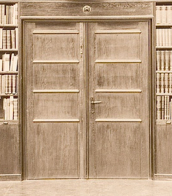

Tycho Brahe, born Tyge Ottesen Brahe, more commonly called Tycho, was a prominent Danish astronomer, astrologer, and alchemist of the Renaissance.
As a young man he traveled extensively throughout Europe, studying in Wittenberg, Rostock, Basel, and Augsburg and acquiring mathematical and astronomical instruments. In 1572 Tycho unexpectedly even for himself discovered a new star in Cassiopeia, and the publication of this turned the young Dane into an astronomer of European reputation. For further astronomical research he established an observatory and gathered around him modern progressive scientists.
Besides practicing astronomy, Tycho was an artist, scientist, and craftsman, and everything he undertook or surrounded himself with had to be innovative and beautiful. He even founded a printing house to produce and bind his manuscripts in his own way, and he perfected sanitary ware for convenience. His development of astronomical instruments and his work in measuring and fixing the positions of the stars laid a solid foundation for future discoveries.
Tycho's observations - the most accurate possible before the invention of the telescope - included a comprehensive study of the solar system and the precise positions of more than 777 fixed stars. What Tycho accomplished using only his simple instruments and intellect remains a remarkable achievement of the Renaissance.


Tycho Brahe, born Tyge Ottesen Brahe, more commonly called Tycho, was a prominent Danish astronomer, astrologer, and alchemist of the Renaissance.
As a young man he traveled extensively throughout Europe, studying in Wittenberg, Rostock, Basel, and Augsburg and acquiring mathematical and astronomical instruments. In 1572 Tycho unexpectedly even for himself discovered a new star in Cassiopeia, and the publication of this turned the young Dane into an astronomer of European reputation. For further astronomical research he established an observatory and gathered around him modern progressive scientists.
Besides practicing astronomy, Tycho was an artist, scientist, and craftsman, and everything he undertook or surrounded himself with had to be innovative and beautiful. He even founded a printing house to produce and bind his manuscripts in his own way, and he perfected sanitary ware for convenience. His development of astronomical instruments and his work in measuring and fixing the positions of the stars laid a solid foundation for future discoveries.
Tycho's observations - the most accurate possible before the invention of the telescope - included a comprehensive study of the solar system and the precise positions of more than 777 fixed stars. What Tycho accomplished using only his simple instruments and intellect remains a remarkable achievement of the Renaissance.


Tycho Brahe, born Tyge Ottesen Brahe, more commonly called Tycho, was a prominent Danish astronomer, astrologer, and alchemist of the Renaissance.
As a young man he traveled extensively throughout Europe, studying in Wittenberg, Rostock, Basel, and Augsburg and acquiring mathematical and astronomical instruments. In 1572 Tycho unexpectedly even for himself discovered a new star in Cassiopeia, and the publication of this turned the young Dane into an astronomer of European reputation. For further astronomical research he established an observatory and gathered around him modern progressive scientists.
Besides practicing astronomy, Tycho was an artist, scientist, and craftsman, and everything he undertook or surrounded himself with had to be innovative and beautiful. He even founded a printing house to produce and bind his manuscripts in his own way, and he perfected sanitary ware for convenience. His development of astronomical instruments and his work in measuring and fixing the positions of the stars laid a solid foundation for future discoveries.
Tycho's observations - the most accurate possible before the invention of the telescope - included a comprehensive study of the solar system and the precise positions of more than 777 fixed stars. What Tycho accomplished using only his simple instruments and intellect remains a remarkable achievement of the Renaissance.


Tycho Brahe, born Tyge Ottesen Brahe, more commonly called Tycho, was a prominent Danish astronomer, astrologer, and alchemist of the Renaissance.
As a young man he traveled extensively throughout Europe, studying in Wittenberg, Rostock, Basel, and Augsburg and acquiring mathematical and astronomical instruments. In 1572 Tycho unexpectedly even for himself discovered a new star in Cassiopeia, and the publication of this turned the young Dane into an astronomer of European reputation. For further astronomical research he established an observatory and gathered around him modern progressive scientists.
Besides practicing astronomy, Tycho was an artist, scientist, and craftsman, and everything he undertook or surrounded himself with had to be innovative and beautiful. He even founded a printing house to produce and bind his manuscripts in his own way, and he perfected sanitary ware for convenience. His development of astronomical instruments and his work in measuring and fixing the positions of the stars laid a solid foundation for future discoveries.
Tycho's observations - the most accurate possible before the invention of the telescope - included a comprehensive study of the solar system and the precise positions of more than 777 fixed stars. What Tycho accomplished using only his simple instruments and intellect remains a remarkable achievement of the Renaissance.
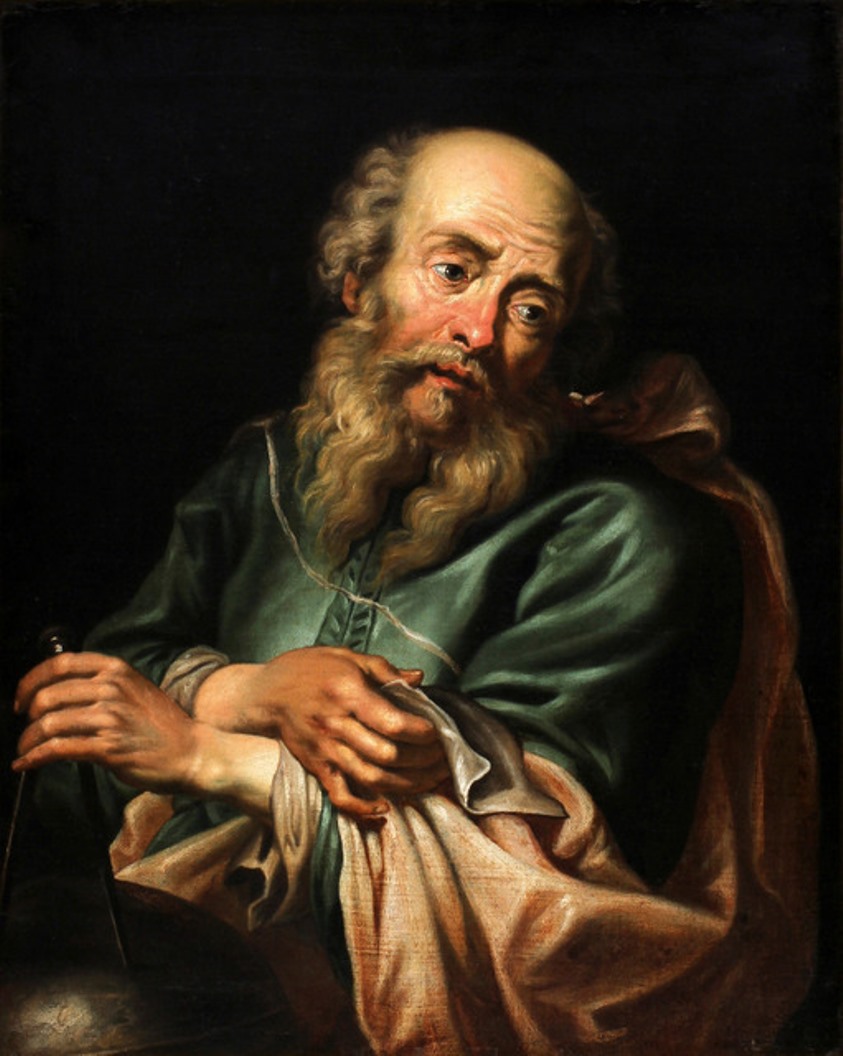
Galileo Galilei was an Italian naturalist, physicist, mechanic, astronomer, philosopher, and mathematician.
Using his own improved telescopes, Galileo Galilei observed the movements of the Moon, Earth's satellites, and the stars, making several breakthrough discoveries in astronomy. He was the first to see craters on the Moon, discovered sunspots and the rings of Saturn, and traced the phases of Venus. Galileo was a consistent and convinced supporter of the teachings of Copernicus and the heliocentric system of the world, for which he was subjected to the trial of the Inquisition.
Galileo is considered the founder of experimental and theoretical physics. He is also one of the founders of the principle of relativity in classical mechanics. Overall, the scientist had such a significant impact on the science of his time that he cannot be overemphasized.
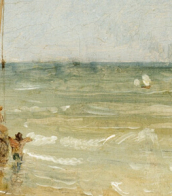

Tycho Brahe, born Tyge Ottesen Brahe, more commonly called Tycho, was a prominent Danish astronomer, astrologer, and alchemist of the Renaissance.
As a young man he traveled extensively throughout Europe, studying in Wittenberg, Rostock, Basel, and Augsburg and acquiring mathematical and astronomical instruments. In 1572 Tycho unexpectedly even for himself discovered a new star in Cassiopeia, and the publication of this turned the young Dane into an astronomer of European reputation. For further astronomical research he established an observatory and gathered around him modern progressive scientists.
Besides practicing astronomy, Tycho was an artist, scientist, and craftsman, and everything he undertook or surrounded himself with had to be innovative and beautiful. He even founded a printing house to produce and bind his manuscripts in his own way, and he perfected sanitary ware for convenience. His development of astronomical instruments and his work in measuring and fixing the positions of the stars laid a solid foundation for future discoveries.
Tycho's observations - the most accurate possible before the invention of the telescope - included a comprehensive study of the solar system and the precise positions of more than 777 fixed stars. What Tycho accomplished using only his simple instruments and intellect remains a remarkable achievement of the Renaissance.

Galileo Galilei was an Italian naturalist, physicist, mechanic, astronomer, philosopher, and mathematician.
Using his own improved telescopes, Galileo Galilei observed the movements of the Moon, Earth's satellites, and the stars, making several breakthrough discoveries in astronomy. He was the first to see craters on the Moon, discovered sunspots and the rings of Saturn, and traced the phases of Venus. Galileo was a consistent and convinced supporter of the teachings of Copernicus and the heliocentric system of the world, for which he was subjected to the trial of the Inquisition.
Galileo is considered the founder of experimental and theoretical physics. He is also one of the founders of the principle of relativity in classical mechanics. Overall, the scientist had such a significant impact on the science of his time that he cannot be overemphasized.
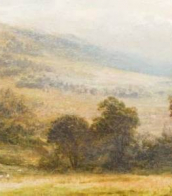

Tycho Brahe, born Tyge Ottesen Brahe, more commonly called Tycho, was a prominent Danish astronomer, astrologer, and alchemist of the Renaissance.
As a young man he traveled extensively throughout Europe, studying in Wittenberg, Rostock, Basel, and Augsburg and acquiring mathematical and astronomical instruments. In 1572 Tycho unexpectedly even for himself discovered a new star in Cassiopeia, and the publication of this turned the young Dane into an astronomer of European reputation. For further astronomical research he established an observatory and gathered around him modern progressive scientists.
Besides practicing astronomy, Tycho was an artist, scientist, and craftsman, and everything he undertook or surrounded himself with had to be innovative and beautiful. He even founded a printing house to produce and bind his manuscripts in his own way, and he perfected sanitary ware for convenience. His development of astronomical instruments and his work in measuring and fixing the positions of the stars laid a solid foundation for future discoveries.
Tycho's observations - the most accurate possible before the invention of the telescope - included a comprehensive study of the solar system and the precise positions of more than 777 fixed stars. What Tycho accomplished using only his simple instruments and intellect remains a remarkable achievement of the Renaissance.
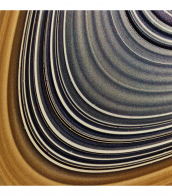
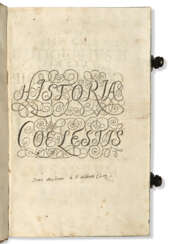









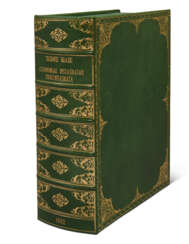

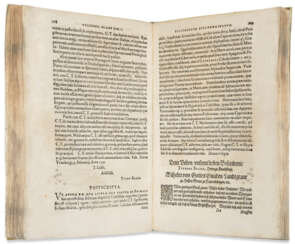

![Epistolarum astronomicarum [and] De mundi aetherei](/assets/image/picture_4401471/cf9d5/52ac6f24e1cf5ec5f99b2e2327578cfe1736866800jpg__fix_374_244.jpeg)
![Epistolarum astronomicarum [and] De mundi aetherei](https://veryimportantlot.com/assets/image/picture_4401471/cf9d5/52ac6f24e1cf5ec5f99b2e2327578cfe1736866800jpg__fix_374_244.jpeg)
